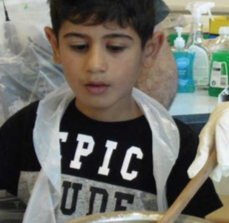Let’s agree on what makes ‘good’ food – then make it a reality for every child in Scotland
30 May 2019
Responding to Call 18 of our 25 Calls campaign, Soil Association Scotland’s Sarah Duley says that if we want to deliver for young people our focus must be on health, the environment – and the economy
Call 18: Take the next step in participation and food education: give communities the keys to school kitchens
The public plate feeds some of the most vulnerable people in society, in our hospitals, schools, care homes, and prisons. With more than 688,000 pupils in Scotland, our school kitchens are uniquely placed to set the tone of children’s relationship with food by tackling health inequalities and creating environments where it is normal, easy, and enjoyable for every child to eat well.
Soil Association is Scotland’s leading food and farming charity, and our vision is good food for all produced with care for the natural world. We recognise that food is about far more than nutrition. It can be a tool for tackling some of the greatest challenges society faces. Diets are inextricably linked to both human health and the climate. The food we eat can nurture human health and support environmental sustainability; it is currently threatening both.
Through Soil Association Scotland’s work, we have developed a definition of good food. By good food we mean:
- Food that’s good for health: lots of fruit and vegetables, fish and wholegrains, less but better quality meat, and a lot less processed food. Good food is even better when shared.
- Food that’s good for the environment: in season, sustainably produced, low-climate impact, and the highest animal welfare standards.
- Food that’s good for the economy: grown by local producers, prepared by skilled and knowledgeable people paid a fair wage, and supporting a thriving economy.
The upcoming Good Food Nation Bill – recently consulted on by the Scottish Government – is an opportunity to join the dots. And there is already great work being done across Scotland which we can build on and take forward.
Our Scottish Government-funded Food for Life programme is showing how local authorities across Scotland can serve good food in schools using the Food for Life Served Here award. The award recognises and rewards councils that are serving school meals that are freshly-prepared from local, seasonal ingredients, using high-welfare meat and free-range eggs, and free from GM ingredients and undesirable additives.
We want to make good food the norm in schools, not the exception. That means building relationships right across the local authority and the wider community: between councillors and chief executives, local producers and suppliers, school caterers, parents, and children, so that everyone recognises the benefits of serving up fresh, healthy and sustainable school meals. That’s one of the reasons we support Donna Borokinni’s call on food participation and education as part of Children in Scotland’s 25 Calls campaign.
Our programme works with local authority elected members to get good food recognised in local policy, and supports catering and procurement teams to help them overcome the cost challenges to serving good food through smart spending and menu design. And we work with caterers in school kitchens – the unsung heroes of children’s nutrition. We support and empower them to find ways to serve up good food in their menus, and to ensure that young people are involved and build their understanding too.
Through their work with Food for Life, primary schools in East Renfrewshire Council (ERC) now receive a weekly box of organic fruit and vegetables. Fresh produce is now reaching schools just a few miles from where it is grown – and local business gets a boost in the process.
As the catering coordinator explains, they put a lot of thought into how best to make the weekly veg box work. “When some of the catering staff saw the harvest squash for the first time, they were unsure what to do with it, so we introduced a newsletter which accompanies the box. It gives information about the vegetables and ideas for preparing them.”
School catering staff also pass this information on to pupils. The box scheme produce supplies the crudités table as well as being part of the main meal, which means pupils can pick what they want for themselves and try different things.
The box illustrates ‘good food’: food that’s good for health, the environment and the economy. But if it didn’t taste good too, the pupils wouldn’t eat it. According to ERC’s catering coordinator: “The taste difference is phenomenal. The pears, for example, tasted amazing. They don’t look perfect, but we chop them up. The apples came in pitted, but we made apple crisps and sprinkled them with cinnamon.”
Our experience of engaging with more than two-thirds of Scottish local authorities through our Food for Life Scotland programme has highlighted the importance of empowering and investing in caterers in unlocking the power of the public plate to tackle the key issues around food. We’re looking forward to working with even more councils across Scotland to make good food a reality for every child.
Sarah Duley is Head of Food at Soil Association Scotland. She is responding here to Call 18 of our 25 Calls campaign by Donna Borokinni: Take the next step in participation and food education: give communities the keys to school kitchens. Click here to read the call

About the author
Sarah Duley is Head of Food at Soil Association Scotland
Click to visit the website
Call 18
Take the next step in participation and food education: give communities the keys to school kitchens
Click to read the full call25 Calls campaign
Find out more about the 25 Calls campaign, view press coverage and read further responses
Click to find out more